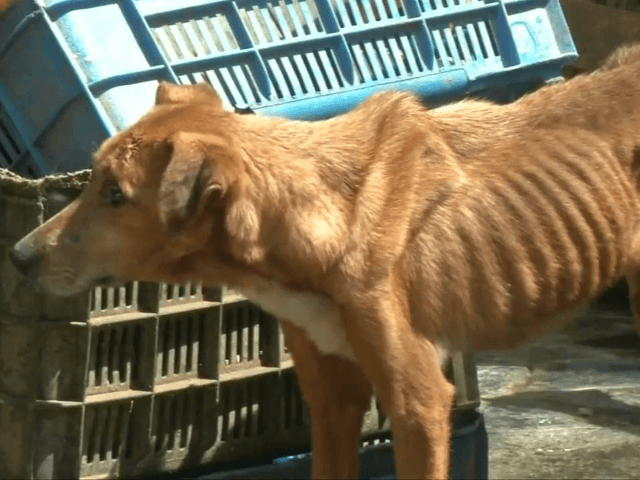The newspaper El Nacional highlights a growing stray dog problem plaguing the streets of Venezuela’s cities this week, triggered by impoverished residents unable to afford dog food and vaccines releasing their animals into the wild.
Most of the dogs are starving and taking over garbage-lined street corners, blocking Venezuelans who scavenge for their own food there. Stray dogs were already a problem in major cities, and reports from as far back as 2016 indicate that the nation’s poorest hunt and eat these dogs. In January, a non-governmental organization (NGO) found that many Venezuelans, unable to afford food for themselves anymore, were buying dog food to feed their families.
El Nacional cites a local NGO, the Canine Support Network (RAC), as finding a sharp spike in the number of pet abandonments documented in the past two years.
“Unfortunately, we see ourselves immersed in this difficult economic crossroads and there are people who, perhaps against their will, see themselves in the difficult situation of abandoning their pet,” Moisés González, who helps direct the group’s spay and neuter efforts, told the newspaper. “I would say we found a 100 percent increase in the number of people who write to us because they can no longer have their pets because they are leaving the country or they don’t have the resources [to feed it].”
El Nacional documents the amount of money it takes to keep a dog in the country. A kilo of dog food, it notes, costs between $0.44 (95,000 bolivares) and $1.40 (300,000 bolivares); the newspaper suggests this amount of food lasts two to three days. A vaccine for a dog could cost as much as $2,327.15 (five million bolivares). The government-mandated monthly minimum wage currently stands at $1.15, according to the exchange rate at currency monitor Dolar Today.
Those who can afford meats have taken to feeding their dogs chicken livers and other body parts typically left behind by human consumption. Those who cannot let their dogs go.
The pet abandonment and stray dog phenomenon is not a new one. In September, Univisión reported that it cost an average of two monthly minimum salaries to buy 20 kilos of dog food, which should last two months, by El Nacional‘s estimate. Abandoned dogs competing with Venezuelans for garbage first made headlines as far back as 2016.
In September 2016, one dog owner told the Associated Press that he often did not have food for his dog. “We, too, sometimes go to bed without having eating, and it’s tough,” Carlos Parra lamented. “Sometimes we give them [dogs and cats] the food we give chickens. We have to because we don’t have anything else.”
Birdseed and other non-carnivorous food is not a typical part of a dog or cat’s diet and can hurt their digestive systems.
In addition to abandoning the pets, some Venezuelans have been forced to eat them. Last September, a video surfaced of two men in Caracas killing and butchering a dog, splitting the meat between them. Zoos have also complained of exotic animals going missing, presumably at the hands of poachers looking for something to eat.
A year before the release of that video, Chacao Mayor Ramón Muchacho condemned the government for creating a situation where his residents were “hunting cats and dogs in the streets and pigeons in open plazas to eat them.”
Dogs appear to be proving more elusive, according to a study by the NGO Provea released in January. In addition to eating the dogs, Venezuelans also appear to increasingly be using their money to buy dog food, as basic human food items like flour, milk, and vegetable oil are strictly rationed and difficult to procure.
“In a tour of different supermarkets around the capital city, members of the Provea team corroborated the claim that, as a result of the economic crisis, Venezuelan buy food intended for animals for human consumption,” the report stated, calling the practice a new “normal.” “In many cases it was observed that many people take the so-called ‘dog sausages,’ whose content is made of ground chicken bones mixed with other non-edible parts of the chicken.”
Those who spoke to the NGO said they served the sausage fried with rice or scrambled eggs.
Dictator Nicolás Maduro has repeatedly blocked international humanitarian aid from entering the country, despite an estimated 15 percent of Venezuelans relying on garbage to eat. Instead, he established the Local Supply and Production Committees (CLAP), in which food aid packages are distributed among Socialist Party officials and handed out to the neighborhood families most loyal to Maduro.

COMMENTS
Please let us know if you're having issues with commenting.